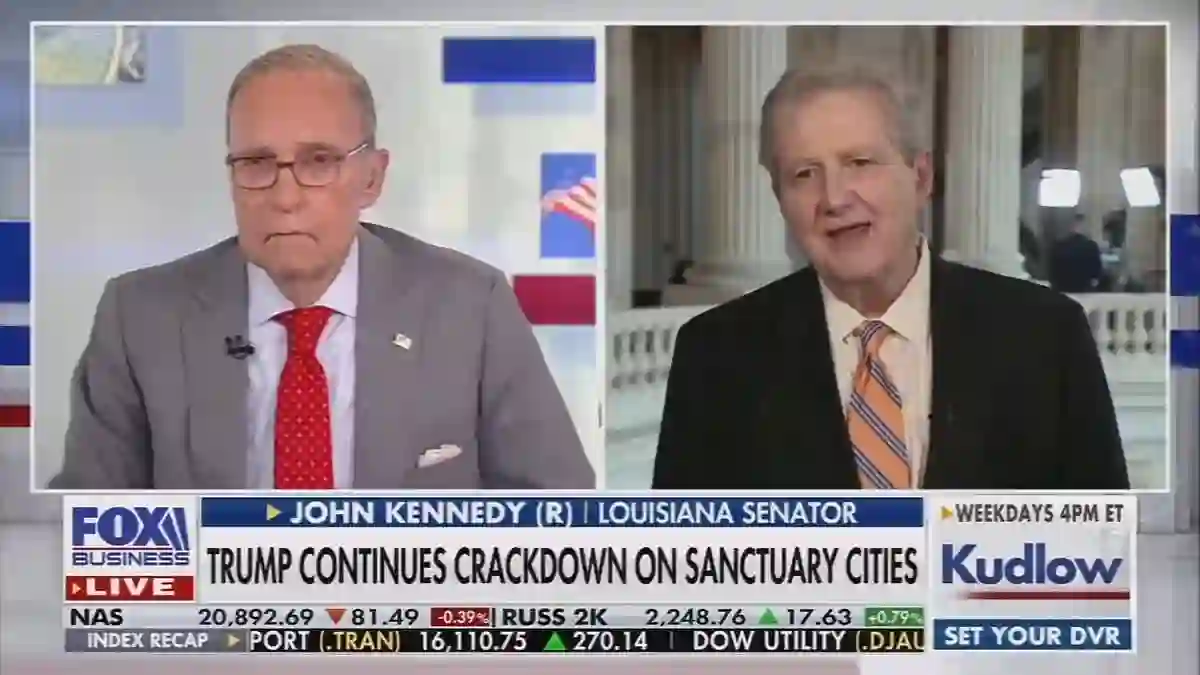A moment of silence during a live TV interview has once again sparked debate over the health of America’s aging political leaders.
This time, it was Louisiana Senator John Kennedy, 73, who raised eyebrows after suddenly freezing mid-sentence on air — and it all happened live on Fox Business.
Senator Kennedy Goes Silent Mid-Interview
During a segment with host Larry Kudlow, Senator Kennedy was in the middle of discussing the Trump administration’s views on sanctuary cities.
As he began making a point about how “Jesus loves immigrants,” his words trailed off into a barely audible mumble. Then came the pause.
For a full seven seconds, Kennedy sat frozen on screen — lips parted, eyes staring blankly forward, completely silent.
Kudlow quickly jumped in, brushing off the incident as a technical glitch.
But viewers were left unsettled, wondering whether something more serious had just played out on live television.
Kennedy Responds with a Statement
The senator later released a statement blaming the odd moment on an earpiece malfunction.
“There was a loud screeching sound in my earpiece — like a 747 taking off.
I stopped talking until it cleared up and thought we were off the air,” he explained.
Kennedy added that the same thing had happened just moments earlier to Senator Rand Paul, who used the same microphone setup.
He also took a jab at The Daily Beast, who originally reported on the moment, accusing them of failing to check the facts with the show’s producers.
“All you have to do is call Kudlow’s producer,” Kennedy said, pushing back at any speculation about his health.
Familiar Territory for Congress
Kennedy’s freeze-up isn’t the first such incident to raise concerns. In recent months, there’s been growing scrutiny around the advanced age of U.S. lawmakers, particularly following several high-profile health scares on both sides of the aisle.
Just last month, Senate Minority Leader Chuck Schumer, 74, was hospitalized for dehydration after reportedly becoming lightheaded at the Senate gym on a scorching hot day in Washington.
Mitch McConnell’s On-Camera Episodes
Meanwhile, Senator Mitch McConnell, now 83, has had a string of public incidents that have drawn even more attention.
In August 2023, he froze mid-press conference for 30 seconds, staring blankly when asked about running for re-election.
Aides had to step in and repeat the question, eventually guiding him away from the podium — much like another similar incident he experienced months earlier.
His office later claimed he had just felt “lightheaded” and was fine, but the footage fueled speculation about his ability to continue serving.
Recent Health Crises Among Democrats
While Kennedy and McConnell have made headlines, Democrats have experienced the bulk of recent congressional health tragedies.
-
Nancy Pelosi, 85, underwent hip replacement surgery last December after a fall in Luxembourg.
-
Virginia Congressman Gerry Connolly, 75, died this year following a battle with esophageal cancer.
-
Rep. Sylvester Turner (D-Texas), 70, passed away after reportedly dealing with cancer in his jaw.
-
Arizona’s Raúl Grijalva, 77, died of lung cancer in March.
-
Rep. Bill Pascrell, 87, from New Jersey died after weeks of respiratory illness in August 2024.
-
Texas Rep. Sheila Jackson Lee, 74, passed away from pancreatic cancer in July 2024.
-
Donald Payne Jr., 65, died in April from undisclosed health issues.
In total, six Democratic members of Congress have died in the past 15 months, underscoring how aging leadership is becoming a pressing concern.
The Bigger Picture
While Senator Kennedy chalked up his on-air freeze to a tech issue, the moment adds to a growing list of awkward, silent, or medically-related interruptions that have become more frequent among senior members of Congress.
It’s no longer just about one gaffe or one malfunction — it’s part of a broader conversation around age, fitness to serve, and leadership succession in American politics.
Whether or not these incidents continue, they’re undeniably prompting both voters and lawmakers to take a harder look at who’s running the country — and whether it’s time for a generational shift.
